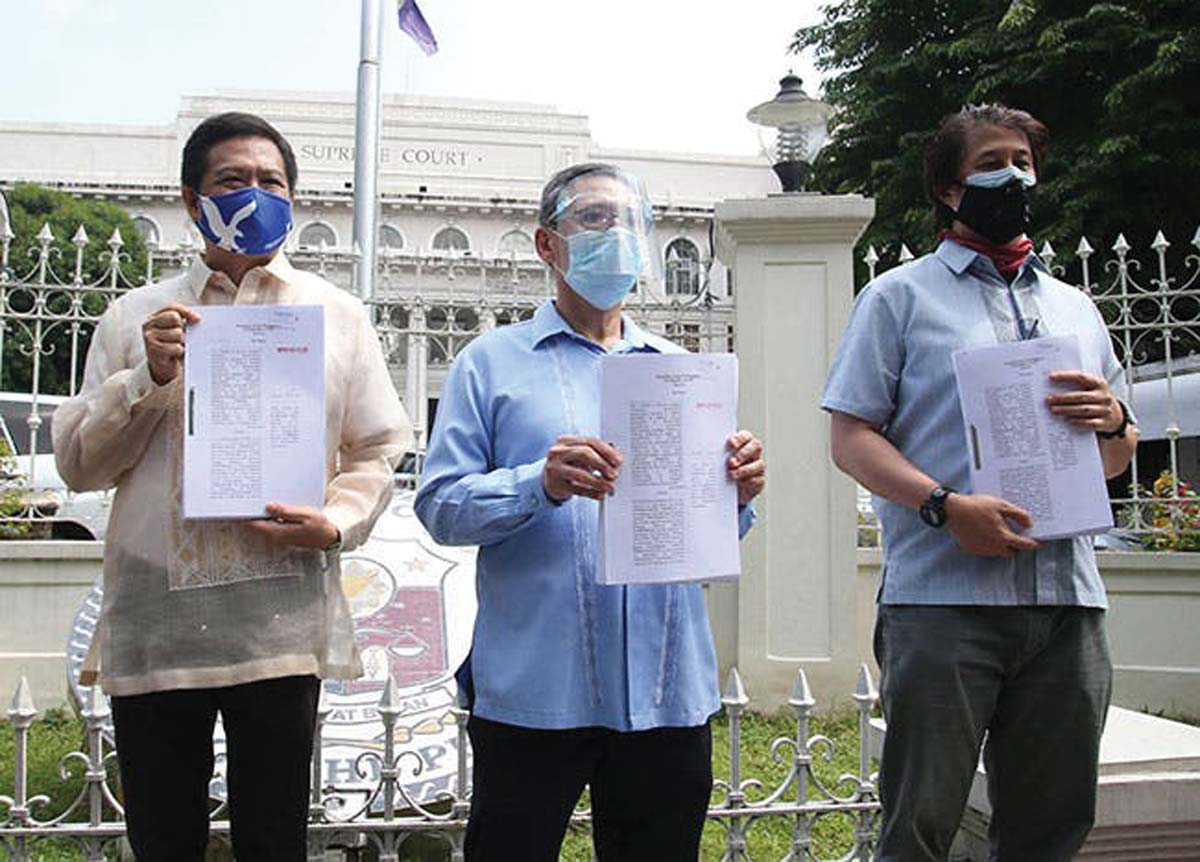
| ManilaTimes.net photo by Rene Dilan
Determining the legality of the Anti-Terrorism Act of 2020 would be up to the Philippine Supreme Court, Justice Secretary Menardo Guevarra said on Friday, July 24.
The justice secretary argued that resolving the legal challenges is under the purview of the high court based on the merits of the suits, not the number of petitions filed.
“All these petitions, no matter how many they are, will boil down to a common set of constitutional issues,” he said.
“The Supreme Court will resolve these issues on the merits of the arguments advanced by the parties concerned, and not on the basis of their number or personal or professional stature,” he added.
As of writing, there are 19 petitions filed against the anti-terror law since President Rodrigo Duterte signed the measure into law on July 3.
The first petition was filed by a group of lawyers on July 4, seeking the issuance of a temporary restraining order and a writ of preliminary injunction to stop the law’s implementation.
“[We] respectfully pray that judgment be rendered by the Honorable Supreme Court issuing a Temporary Restraining Order, Writ of Preliminary Injunction and/or Other Injunctive Remedies to prevent the enforcement of the anti-terrorism act beginning July 19, 2020, the same having been published in the Official Gazette on July 3, 2020,” the group, led by law professor and lawyer Howard Calleja, said.
The latest petitions filed on Friday were by leaders of churches led by Catholic Bishop Broderick S. Pabillo; a coalition of women’s organizations represented by the General Assembly of Women for Reforms, Integrity, Equality Leadership and Action, Inc. (Gabriela); and the Alternative Law Groups, Inc. (ALG).
In Pabillo’s petition, the church leaders said they were “alarmed about the passage into law of the Anti-Terrorism Act of 2020.”
“The Honorable Court must have heard of people active in social advocacies who are accused of being communists. Even bishops, priests, and the religious were included among those charged by the Philippine National Police with crimes of sedition and inciting to sedition, solely because of their social advocacies,” they added.
The ALG’s petition, meanwhile, pointed out that “a law which cannot specify the acts that it prohibits cannot be valid.”
Gabriela, for its part, said the anti-terror law’s definition of terrorsm “gives its implementing body, the Anti-Terrorism Council, unbridled discretion and give it room to implement the law as an ‘arbitrary flexing of the government muscle’ against its perceived enemies.”
The anti-terror law took effect on Saturday, July 18, despite the lack of implementing rules and regulations.
Guevarra said that the drafting of the IRR is “just about to start” and will be ready within 90 days.
“The law will take effect even without the IRR because the promulgation of the IRR is not a condition for the effectivity of the law. Some provisions are self-executing, like the organization of the ATC,” he said.
“But there are provisions where operational details need to be spelled out or standards clearly defined in the IRR for proper implementation of the law,” he added.
Under the anti-terror law — which expands on the Human Security Act of 2007 — incitement of terrorism can be done “by means of speeches, proclamations, writings, emblems, banners or other representations…without taking any direct part in the commission of terrorism.” Those arrested and detained may be held for 14 to 24 days.
The new law enables the suspected “terrorist” to also be placed under surveillance for 60 days, extendable by up to 30 more days, by the police or the military.
Acts punishable under the law include:
• Engaging in acts intended to cause death or serious bodily injury to any person, or endangers a person’s life;
• Engaging in acts intended to cause extensive damage or destruction to a government or public facility, public place, or private property;
• Engaging in acts intended to cause extensive interference with, damage, or destruction to critical infrastructure;
• Developing, manufacturing, possessing, acquiring, transporting, supplying or using weapons; and
• Releasing of dangerous substances, or causing fire, floods or explosions.
• Any person who proposes, incites, conspires, participates in the planning, training, preparation, and facilitation of a terrorist act, as well as those who will provide material support to terrorists and recruit members in a terrorist organization, will also be penalized by life imprisonment without the benefit of parole.
Meanwhile, anyone who threatens to commit terrorism, and those who propose any terroristic acts or incite others to commit terrorism, will suffer imprisonment of 12 years.
This goes the same for anyone who voluntarily and knowingly joins any organization, association or group of persons knowing that such is a terrorist organization.








